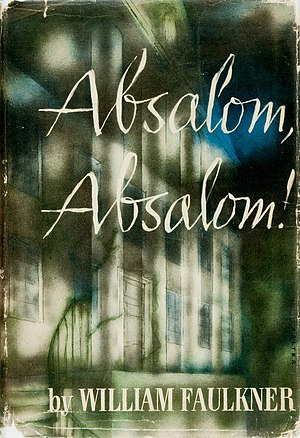Absalom, Absalom!
 | |
| Written by: | William Faulkner |
|---|---|
| Central Theme: | |
| Synopsis: | |
| First published: | 1936 |
Absalom, Absalom! is a novel by William Faulkner, possibly the most dense of his works, and is very long. It details the rise and fall of Thomas Sutpen, a poor white man who comes to Mississippi to build his fortune. The events of the novel are partially related by Quentin Compson to his roommate at Harvard, shortly before Quentin kills himself.
The plot spans several decades before, during, and after the civil war, describing the intertwined fates of several southern families.
The title comes from the biblical story of Absalom, a son of David, and refers to the ultimate fate of the Sutpens.
Tropes used in Absalom, Absalom! include:
- Big Fancy House: Sutpen builds one with the help of a bunch of slaves and a French architect, although it is fallen into disrepair by the end of the novel.
- Brother-Sister Incest: It's vaguely implied that Henry has a thing for his sister Judith, as well as the fact that Charles is Judith's half-brother. Also there's Quentin.
- Downer Ending: Not only in the tale of the Sutpens, but especially if you know what happens to Quentin afterward.
- Heir Club for Men: Sutpen keeps remarrying in the hope of producing a male (white) heir to continue his legacy.
- Ho Yay: Henry is a bit too obsessed with Charles, and it's vaguely implied that he has sexual feelings for him.
- Incest Is Relative: The reason Charles cannot marry Judith is because he is her half-brother, and Sutpen's illigitemate son.
- I Will Wait for You: Judith to Charles
- Knight Templar Big Brother: Henry protects the honor of his sister Judith by killing Charles, her fiance, after finding out that he is their father's illegitimate son. Strangely, he's perfectly okay with the incest. What he ultimately can't abide is that Charles is part black.
- Literary Allusion Title: The title comes from the biblical story of Absalom.
- Maligned Mixed Marriage: Sutpen renounces his marriage to a plantation owner's daughter after finding out she has black blood.
- Rags to Riches: Sutpen, although this being Faulkner, it then goes back down the other way.
- The Rashomon: The story has several different narrators, each with their own biases about what happened to the Sutpens, and it is left up to the reader to decide what is true.